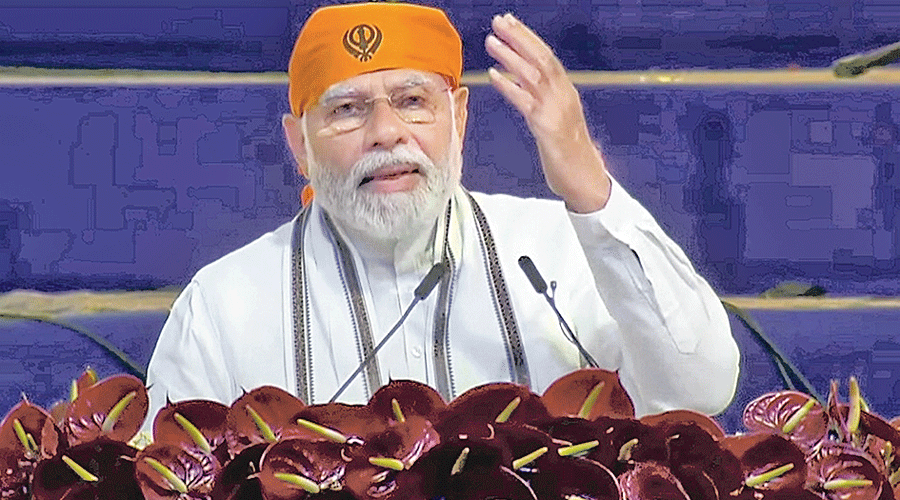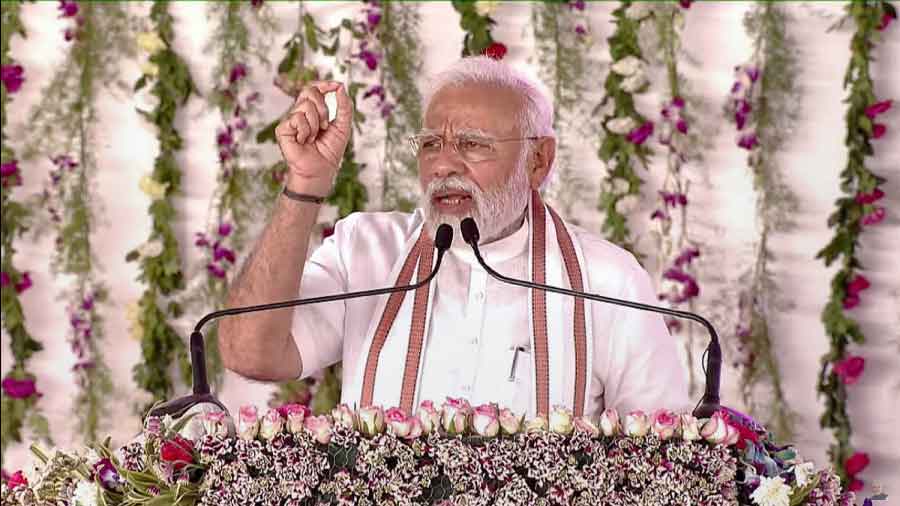In his address from the Red Fort on the 400th birth anniversary celebrations of Guru Teg Bahadur, the ninth Sikh guru, Prime Minister Narendra Modi invoked Aurangzeb as he appeared to try to find common ground between Sikhs and the Hindutva hawks — an attempt that academics have said falls flat.
“History is witness, this present time is witness and this Red Fort is also witness to the fact that even though Aurangzeb and his tyrants had severed many heads, they could not separate our beliefs and devotion from us,” Modi said on Thursday.
Guru Teg Bahadur was beheaded at Chandni Chowk in Delhi in 1675 on the orders of the Mughal emperor for standing up against the forcible conversion of Kashmiri Pandits to Islam.
“The PM retold the literal story of Guru Teg Bahadur without looking at his principles. Guru Nanak rejected the janeu (sacred thread that Brahmins wear), and the ninth Guru stood for the right (of the Kashmiri Pandits) to wear the janeu against the orders of a tyrannical ruler,” the author and chronicler of Punjab, Amandeep Sandhu, told The Telegraph.
Guru Nanak was the first Sikh guru. Born into a Hindu family, he denounced the caste system and taught that all human beings are equal.
“The message is to stand for the oppressed and the downtrodden. That is not the message the Prime Minister conveys. He is just using the Sikh story to fan Islamophobia. If they want to do justice, they should tell the whole story with the principles of the faith. That they will never do as they only want to appropriate and misrepresent,” Sandhu added.
Ironically, the barbican of the Lahori Gate from which Prime Ministers deliver their address was added to the Red Fort by Aurangzeb.
Paramvir Singh, head of the Sikhism encyclopaedia department at Punjabi University, told this newspaper that Guru Teg Bahadur had spent five years in eastern and northeastern India, including undivided Bengal, where he built strong relationships with rulers and leaders of other religions.
“There was no ‘other’ in the eyes of Guru Teg Bahadur. He intervened when he saw the violation of the order of God by forcible conversions by Mughal officials. Among his close followers were Muslim rulers like Shaista Khan, the governor of Bengal, and Nawab Saifuddin who had served as governor of Kashmir and Agra,” Singh said.
A lawyer and activist of Sikh ancestry, Suranya Aiyar, said: “It is painful, but not surprising, that the Prime Minister would use a sacred and spiritual occasion such as the birth anniversary of Guru Teg Bahadur to try and make a connection to the politics of the Hindu Right wing in which thousands of years of ‘ghulami (slavery)’ by Indians, the oppressive rule of Emperor Aurangzeb and forced religious conversion are well-known themes, which he (Modi) pointedly brought into his address.”
She added: “It is true that the Sikhs have a history of rebellion against Aurangzeb. But they also have a much more defining history of questioning and eventually separating from Hinduism as a philosophy, culture and faith. So, as an attempt to find common ground between Sikhs and the Hindu Right wing, the speech falls rather flat.”
Sandhu referred to the recent wave of communal strife and said: “Sikhs believe that the Gurus live on through the Guru Granth Sahib and they are standing with Muslims today and they stand with tribals, women and Dalits, against everything Hindutva — which is the oppressive force today.”
On Thursday, the same day that Modi spoke, PTI quoted Jathedar Akal Takht Giani Harpreet Singh — revered as the voice of Sikhs — as saying during celebrations at Amritsar’s Golden Temple: “The motive of the martyrdom of Sri Guru Teg Bahadur Sahib ji was to provide the right to practise the faith/ religion to everyone but today in India, by going against the ideology of the Guru Sahib, the religious beliefs of minorities are being suppressed.”
According to Encyclopaedia of Sikhism, Guru Tegh Bahadur was born on April 1, 1621. The celebrations of his 400th birth anniversary began last year.











